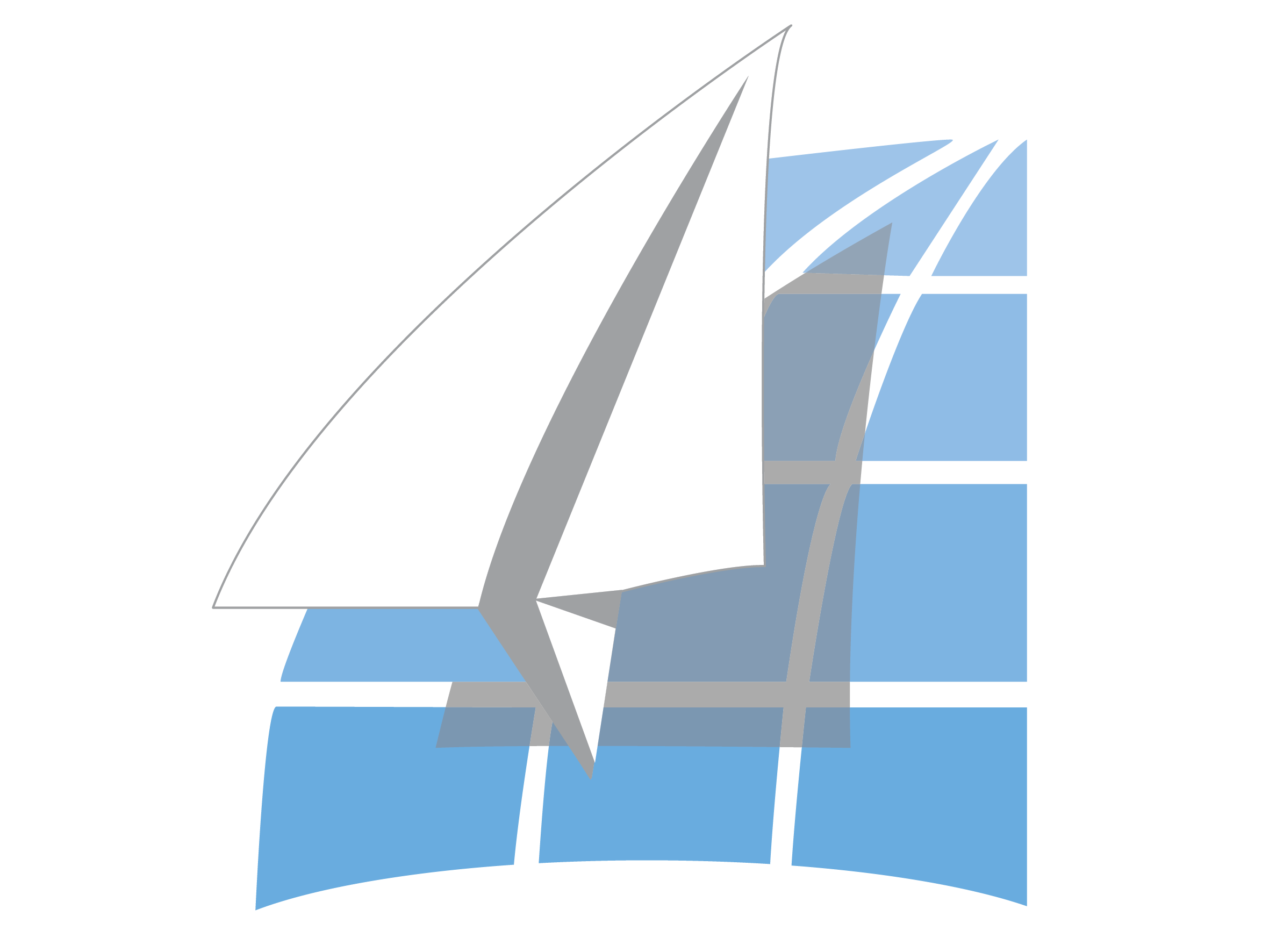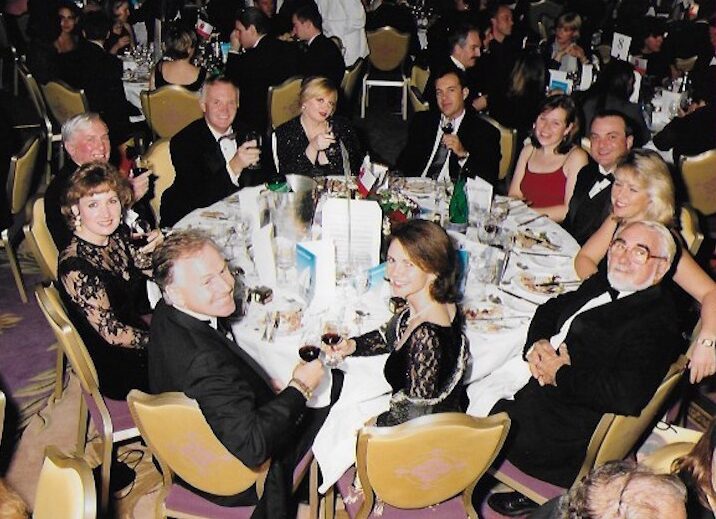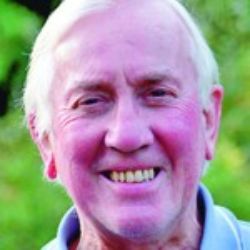Though outwardly not as dramatic as the looming ‘ new media’ tsunami of the ‘noughties, the ‘nineties saw the guild move rapidly from a comfortable neutral to top gear.
‘Every member has his, or her, own idea of whom kick-started the Guild’s “modern era” , agreed Paul Wade, chairman from 1993-95, and his wife Kathy Arnold. ‘We’ll plump for Robin (Rob) Neillands the decade’s first chairman.’
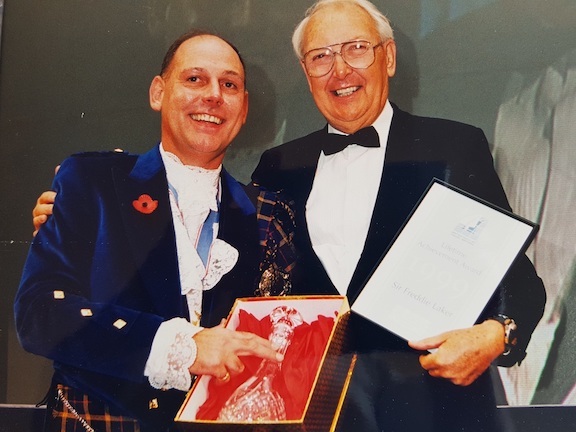
Few would argue with that. My personal regret is that Rob did not live to see how, to quote his Press Gazette obit, ‘ his new broom swept clean with military efficiency .’
Rob’s reforming role came as no surprise to Clive Tully.‘ While many BGTW members remember Rob as the chairman who dragged the guild kicking and screaming into a more professional outlook, not so many will know that he did something similar for outdoor writers a decade earlier.
‘ When I started freelancing in the early 1980s, Rob was already well known in the outdoors world. A former salesman for Pan Books, he had the inside knowledge about the book market to exploit a niche which hadn’t really been covered before, namely lots of small books containing the nitty-gritty on how to do things in the outdoors – backpacking, climbing, and navigation. These little Spur Books became essential reading for anyone keen to get out there and do it.
‘ The defining moment came at a post-trade show drink in a bar in Harrogate when Rob suggested to several outdoor writers that they get together to form a guild. And so the Outdoor Writers Guild was born. I came to know Rob well in the early 1990s. Proposed by him, I’d recently joined the BGTW, and he had just been elected chairman. He encouraged me to stand for committee – at the time I was also on the committee of the OWG so it made life pretty interesting. We went on several trips together, although sadly I never joined him on any of his big walks.’
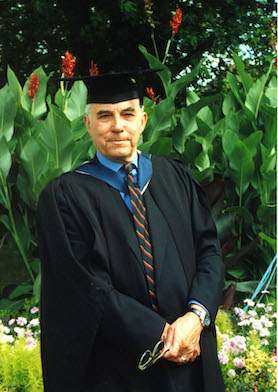
For someone who always professed himself not to be a real walker, Rob notched up some pretty impressive achievements. He walked across France, 600 miles from the Channel coast to the Carmargue also 700 miles across Spain from Santander to Gibraltar. Clive recalled one trip to Cyprus when ‘ Rob and I were walking with a young lady from Cyprus Tourism through a small village in the Troodos Mountains. “I remember this place,” says Rob. “I’ve been here before.”
“Oh, really? ” smiles our guide. “Yes,” Rob continues. “ Last time I was here, they were throwing stones at me! ” – Rob at the time having been a young member of 45 Royal Marine Commando, serving in Cyprus during the EOKA and the Middle East crises. He wrote about his experiences, and a lot more besides, producing military histories considered the most authoritative in their field.
Clive also revealed a secret that probably few members know. ‘ Rob once did a fiction writing course – the kind of thing you can book up to do as a holiday – primarily to write a feature about the experience needed for the travel pages of a national newspaper. The course involved actually writing a novel, and once done, Rob promptly sold it to a publisher. Produced under the name “ Robin Hunter ,” ( one of his numerous nom de plumes) it became a best seller in the USA. ‘ The film rights sold annually for a handsome sum for many years, and I can remember one lunchtime when he was bubbling with enthusiasm to tell me that after several false starts, filming was finally going ahead.’
Directed by John Irvin, “The Fourth Angel” (2001) the impressively stellar cast included Jeremy Irons, Charlotte Rampling and Timothy West. It was also the last role for Lois Maxwell James Bond’s original Miss Moneypenn. Irons was scheduled to play Jack Elgin ( the hero is Simon Quarry in the book ), a magazine editor who takes his family off on a working trip where the aircraft is hijacked by terrorists, and in a bungled rescue attempt, his wife and two daughters are killed.
The story turns into a classic revenge thriller when the terrorists are allowed to escape, and Elgin plots his own redress. It had all the makings of a box office hit, but unfortunately 9/11 got in the way . The film’s release was delayed in order not to upset sensibilities, and by the time it came out in 2004 it went straight to video / DVD.
In later years, Rob picked up degrees along the way, studied for in his spare time, and interspersed his continuing prodigious output of books with lecturing on military history, at the likes of Oxford University and the National Army Museum. Even in the advanced stages of his illness he was still planning to write a book about Field Marshall Montgomery.
For comparative newcomers, Penny Visman and Peter Jolly, their first meeting with Rob was while enjoying a glass of wine at a guild meeting at The Savoy Hotel in London in 1991. We were approached by Rob who was taking over as chairman,’ said Peter. ‘ His words to us were “I am going to ruffle a few feathers and put some noses out of joint but I am determined to put the Guild on a more professional footing. Would you like to join me on the committee? ” Perhaps not the most engaging of invitations but both Penny and I agreed and true to his word Robin started transformation of the Guild looking, for example, to form an Associates section for members who were no longer active.’
It proved to be a timely encounter. At a later stage, Peter became an adept treasurer helping the committee to transform over a period of 12 years what he recalled was a figure of under £100 to figures in excess of a £100,000 yearly turnover. The first big game changer was the annual awards dinner at The Savoy, which made ‘ thousands of pounds for the guild.’
‘ Yet another bold decision,’ added Peter, was to turn the list of members booklet into a moneymaking commercial Yearbook full of vital travel industry information. This became the travel Bible for PRs and made considerable sums of money for the Guild. John Ruler did all the background work and was responsible for the successful launch. The third major change was the introduction of a paid secretariat since the guild secretary could not be expected to handle the huge increase in work. ‘ Obviously the staff has changed over time but in recent years we have been blessed with an excellent secretariat in Benita and Rob.’ added Peter.
‘ Now, looking at the guild from afar (well West Sussex) it is refreshing to see so many young talented writers joining the guild with itself moving with the times and encompassing everything the new technology has to offer .’
FOR the Wades, their travel career began in radio. ‘ Our son accused us of not having proper jobs, ’ said Paul. ‘ Our family reckoned we were always on holiday. But after some of them travelled with Kathy on research trips they changed their tunes! ’ It was when Paul and Kathy became regulars on the BBC Radio 4’s Breakaway programme that the late Roger MacDonald, the creator and producer, invited them to join the guild in 1986.
Paul, when he took over the chair in 1993, was keen to carry on Rob’s good work as were subsequent ‘nineties chairmen and women to whom – and I speak personally as a committee member throughout the decade – we owe a deep debt of gratitude. ‘ Like Rob,’ said Paul ‘ I appreciated the hard-working committee members, who travelled to London meetings from Norfolk, Suffolk, Sussex and Kent. Also important were members, who volunteered to “make meetings happen”. Names that spring to mind are Peter Jolly, Lucy Koserski, Penny Visman, John Lloyd and Michael Leech.’
Penny , elected secretary when Rob became chairman, recalls: ‘ Never having met him before I said: “ I have to admit, I voted for Eric Bailey who was standing against you ” – ‘Oh so did I ’ replied Rob – ‘ but here we are, so let’s work together.’ Rob, she reiterated, was tireless in his support of the guild and his committee was enthusiastic and innovative. He was generous too in sharing his many press connections.
‘ Rob became a lifelong friend of mine,’ she said, ‘ and I was honoured, and surprised, when he dedicated one of his military history books to me: ‘The Dervish Wars – Gordon & Kitchener in the Sudan 1880-1898’, published by John Murray in 1996. This was because I had been so enthusiastic in telling him about my two years living in The Sudan in the 1970s, with my husband Peter who worked for Shell.’
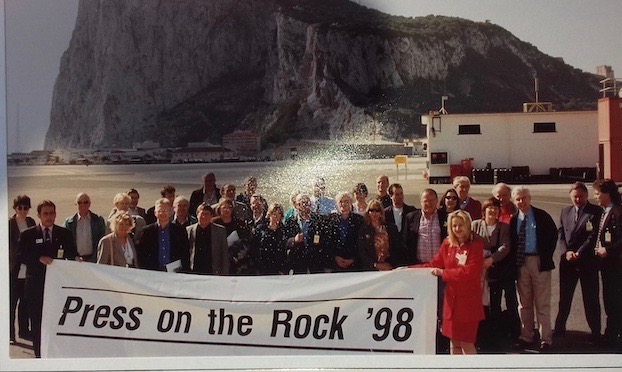
For Annette Brown, in the chair for the next two years, it was a case of seeing travel from both sides of the proverbial fence. ‘ I’d spent half my career working overseas before I joined the guild. I started as a monitrice in a Colonie de Vacances in France as an 18-year old, then came a three-month student-exchange assignment in Sweden, and a year teaching in Jamaica with VSO, before I joined the British Travel Association, as it was then called, in St James’s Street.
‘ The BTA send me on year long assignments to the Tourist Information Centres in Paris, New York and Mexico, before re-calling me to their editorial unit to oversee the translations of 12 regional guides, and create new books including Touring Historic Britain’, and Britain by Car. I edited their new magazine: ‘London Week’ and established the Teletourist service. Adele Evans ( of whom more later) recorded my copy in the BTA ’s Radio department. I also contributed articles to the sorely missed magazine ‘In Britain’ for the late Bryn Frank.
She added: ‘ I transferred to the newly formed English Tourist Board to head up the Travel Press Unit in the 1980s. Here was the ideal chance to introduce English tourism projects to the BGTW by hosting their meetings at the Grosvenor Gardens premises. For blissful three years, I toured the country with guild members and other travel journalists.
‘ I jumped ship when Express Newspapers offered me a Travel Editor’s position. An invitation to join the guild followed. I was ‘’coerced’’ on to the Committee and finally into the chair. My proposals for the BGTW’s overseas environmental award – for Austria’s Hohe Tauern National Park and Antalya’s restoration of its Ottoman port – won the Silver Otter (as it was then known ). So I initiated the idea of what became the annual Savoy Dinner to create a larger stage for these awards.’
For Gary Buchanan, chairman 1998-2000, his interest in the Guild dated back to 1991. Living in Scotland, he was invited to a post AGM dinner held at the Balmoral Hotel in Edinburgh. ‘ The Secretary at the time, Penny Visman took me under her wing and introduced me to Robin Neillands, the charismatic Chairman. I became a member later that year.’
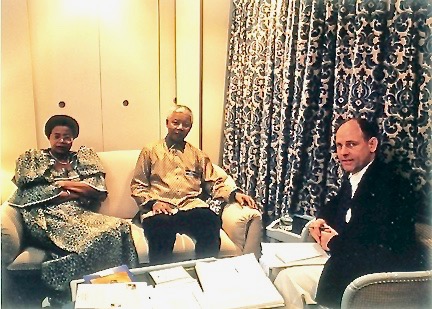
He quickly became involved in arranging special guild events, the first of which was a dinner in the Secret Garden at The Witchery in Edinburgh, inviting Sir Michael Bishop, chairman of British Midlands Airways, as guest speaker.
But it was his love of cruising, especially the heritage of Cunard Line that sowed the seeds of two spectacular trips. In mid- September 1996 after ‘ several cordial lunches and pow-wows with Eric Flounders, Cunard’s PR director ’, 43 members and partners flew to New York, courtesy of United Airlines, for a short stay before embarking on the QE2 for the five-night trans-Atlantic voyage home. So impressed was Eric at the editorial response that in September 1997, 46 members repeated the trip. Annette Brown made a presentation to Captain John Burton-Hall at a private cocktail party on the last night.
It was during Annette’s chairmanship that Gary Buchanan, recently appointed vice-chairman, shared her belief that the awards ceremony could become a flagship event for the guild. But it needed a higher profile. ‘ It dawned on me that tourism chiefs and delegates from all over the world gathered in London prior to WTM and were making their own plans for the evening prior to the show opening on Monday morning. It was eureka time – why doesn’t the guild arrange a lavish event in the prestigious Lancaster Ballroom at The Savoy?
‘After countless meetings with the banqueting manager at The Savoy, ‘ not to mention much arm-twisting with VISA International ’ the first of the annual Awards Dinner, initiated by Annette and masterminded by Gary, took place on Sunday November 16, 1997. The principal guest was Tom Clarke CBE, MP – Minister for State for Film and Tourism. The event proved hugely successful and became the hot ticket for movers and shakers of the travel industry on the eve of World Travel Market.’ said Gary . The event took on a life of its own – thanks to the creative production talents of John Bell.’
‘ By this time it had become obvious that the Awards evening, along with sales of the Yearbook and annual subscriptions, were the principal sources of income for an ever-expanding membership. We had an enterprise that was too onerous for the Treasurer alone to manage.’ said Gary. ‘ Following my elevation to chairman, I appointed a new Secretariat in Ann Garland who took on the role prior to our second Awards Dinner in 1998.
‘ As the event’s stature in the travel industry increased, so did the sponsorship. In 1999 The Minister for Tourism in Gibraltar was immensely generous, so, too, were the Bahamas Tourist Office the following year; such magnanimity was followed by sizeable cheques from Visit Florida and Jordan Tourism in 2001 and 2002.
‘ Naturally the sponsors wanted a high-profile delegation at the dinner so it wasn’t long before the Toastmaster would welcome guests with the citation: “Your Excellencies, Ministers, Ladies and Gentlemen.” In 2001 our guest of honour was Lord Pendry , Chairman of the All Party Tourism Committee.
‘ By now we were regularly seating over 400 guests in the Lancaster Ballroom – including approximately 80 Guild members invited by PRs of tourist boards and other travel organisations.
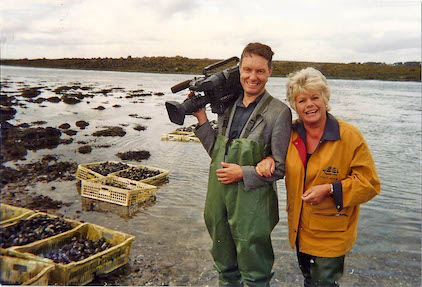
‘ We also had many high-profile recipients of our Lifetime Achievement Awards. These included our own Judith Chalmers OBE, Eric Newby, Patrick Leigh Fermor and John Blashford-Snell.
Gary, who handed over the chairmanship to Martin Roberts at the AGM held in Chester on January 12, 2000, continued to organise the dinner until 2003 when Mary Anne Evans took on the time consuming task.
‘ It would be remiss of me ’, added Gary, ‘ not to acknowledge those members who offered their inimitable talents and were instrumental in ensuring the longevity of this event. I doff my hat to John Bell, John Carter, Martin Roberts, Alison Rice, David Prest and the much-loved Anne Gregg who we sadly lost in 2006. I was truly honoured when my contributions were acknowledged in the form of a Life Membership which was bestowed on me by Chairman Mary Johns at the 2004 AGM held in Troyes.’
Like many other would-be members, Anna Hyman confessed that ‘ when I went on holiday I usually came home and wrote up the trip, complete with train tickets, photos, etc. But it was purely for my own enjoyment. It never entered my head it might become a career.’ It was through starting work with solicitors and branching out into legal publishing, where she ran the reader offer department for a magazine friend, that ‘one he day needed a travel filler – 500 words on one of the Channel Islands I seem to recall.’
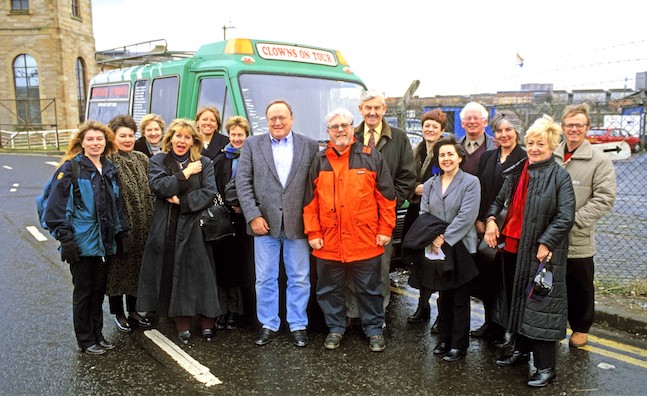
‘ It was a case of forget the law, forget reader offers – travel writing was wonderful. But I knew little about it and consequently after a year I approached the guild. My request to join was quite rightly turned down – not enough experience. But three years later at a big travel forum in Italy I found myself sitting opposite the then guild secretary (the late and much respected Paul Mansfield) and it was he who said it was high time I joined the guild in the early part of the ‘nineties.
‘ About three years later my husband died, and I then discovered a different aspect of the guild. Members, who didn’t know me that well, and only two or three of them had met my husband, wrote me the loveliest of letters. Whatever the future for the guild, and I can see no reason why it should not go from strength to strength, whatever difficulties the travel industry finds itself in, I hope it never loses that human touch of members caring for and supporting members.’
The decade also saw the birth of Globetrotter, which, inspired by Rob and edited first by Clive Tully and later by Tim Locke, said as much, and sometimes more, about the Guild as any formal minutes and reports ever can. How many, for instance, can remember holding our annual meeting in ‘ The House of Commons ‘ – not at Westminster but the Granada Studios – or eating fish and chips wrapped in the Financial Times and served on arrival at the V&A Hotel. It was all recalled in the January 1993, issue of Globetrotter, along with a warning from Rob that ‘ there’s a recession on … and most of us ordinary people are having a thin time.’ Sound familiar – though nothing compared with the Covid pandemic yet to come. Also a foretaste of future changes was Computers – Friend or Foe? – with Kathy Arnold putting in a word the following month for Pcs, the emphasis having been on Macs (I still prefer my Mac, Kathy!)
With a trend towards trips going to those ‘ with firm commissions for quality publications’ PR companies ‘ seduced by big name publications’ came under fire, with Clive Tully pointing out that while specialist publications may not be huge in circulation terms, they offered targeted markets often worth more in response rate than a feature in one of the nationals. He was responding to remarks by Melissa Shale’s of the huge reference value of guidebooks – though, she said, ‘ it is almost impossible to get a flight to do a guide now – even with a sheaf of commissioning letters! ’ Some topics, it seems, continue to plague us – and in Ground Hog Day fashion probably always will.
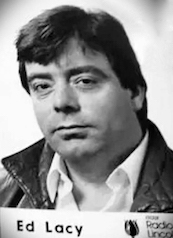
Clive Tully reflects on the life of Ed Lacy: Ed ( Hedley, if you were writing him a cheque or addressing something official to him) and l met in January 1985 in the most unlikely of circumstances – or perhaps not, given the nature of our business.
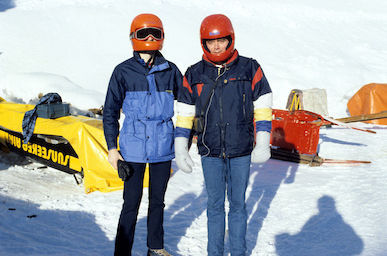
We were about to take a ride as passengers in a four-man bobsleigh down the Olympic Bob Run in St. Moritz. The ride was unforgettable – terrifying – and it was Ed, not me, who elected to do it again the following day just to make sure he got the best possible recording on the Sony Walkman Pro slung around his neck. He was a star presenter for BBC Radio Lincolnshire, with his own three-hour show.
That evening we dined together reliving those 90 seconds of pure adrenalin rush, when out of the blue he asked if I’d make him a tape about walking. He’d recognised something in me I’d failed to appreciate myself – a broadcastable voice – and from that initial radio feature was spawned the idea of our making travel cassettes together, and then later on, syndicated radio features.
The programme “Travelscene” was very much Ed’s baby. He’d started it long before we met as the main travel output for BBC local radio stations, and when a round of cost-cutting stopped their own internal distribution, Ed saw the opportunity for us to do the same thing on a commercial basis. For the first few years, we put together “bumper bundles” of material for distribution at the beginning of each year. Eventually the whole operation went monthly – a major move on our part, and one, which was to prove successful.
Our working relationship was very much the “chalk and cheese” affair. We always joked that l covered the sleeping in ditches end of travel, while Ed did the five-star hotels and gourmet meals – something upon which Ed could claim to be an expert. As a former restaurateur, he could talk about food and wine with a great deal of authority, and I do remember being with him in restaurants once or twice where the waiter received a mild ticking-off from Ed because something wasn’t quite the right temperature!
As a broadcaster, he was a true professional. Many times l sat in with him in the studio at BBC Radio Lincolnshire when he was doing a live programme, and marvelling at the way he’d deal with an awkward phone-in. One of our first commercial ventures was an audio guide to East Anglia, recorded over three days in a lightning tour of the region. I mean lightning, too – we were travelling from one location to the next in his Porsche 924!
lt took me at least two years after l joined the Guild to persuade Ed to apply for membership himself, but once in, his interest in the Guild’s affairs grew to the point where he found himself on the committee. He never quite got there, but I’ve no doubt he would have made a very fine chairman.
Away from the guild, Ed threw his energies into organising an enormous annual charity event in Lincoln, the Family Fun Weekend, using his star presenter status to persuade Lincolnshire businesses to offer generous support. After a year in which he’d endured surgery and chemotherapy, he was still able to supervise the 1998 weekend before passing away the following day . I was fortunate enough to see Ed 10 days before I headed off to the Tien Shan mountains of Kazakhstan on a three-week trek. He was looking tired and drawn, but still his usual chirpy self. It was only when I returned with a serious ankle injury that I learned that he’d died, that people had tried to contact me to no avail, and his funeral had taken place. Whenever I returned from a trip, the first phone call I received would invariably be a “How are you doing?” from Ed, and this time of course it wasn’t to be. But sorting out the affairs of our business partnership meant I inherited his computer workstation. It has been the mainstay of my office ever since.
